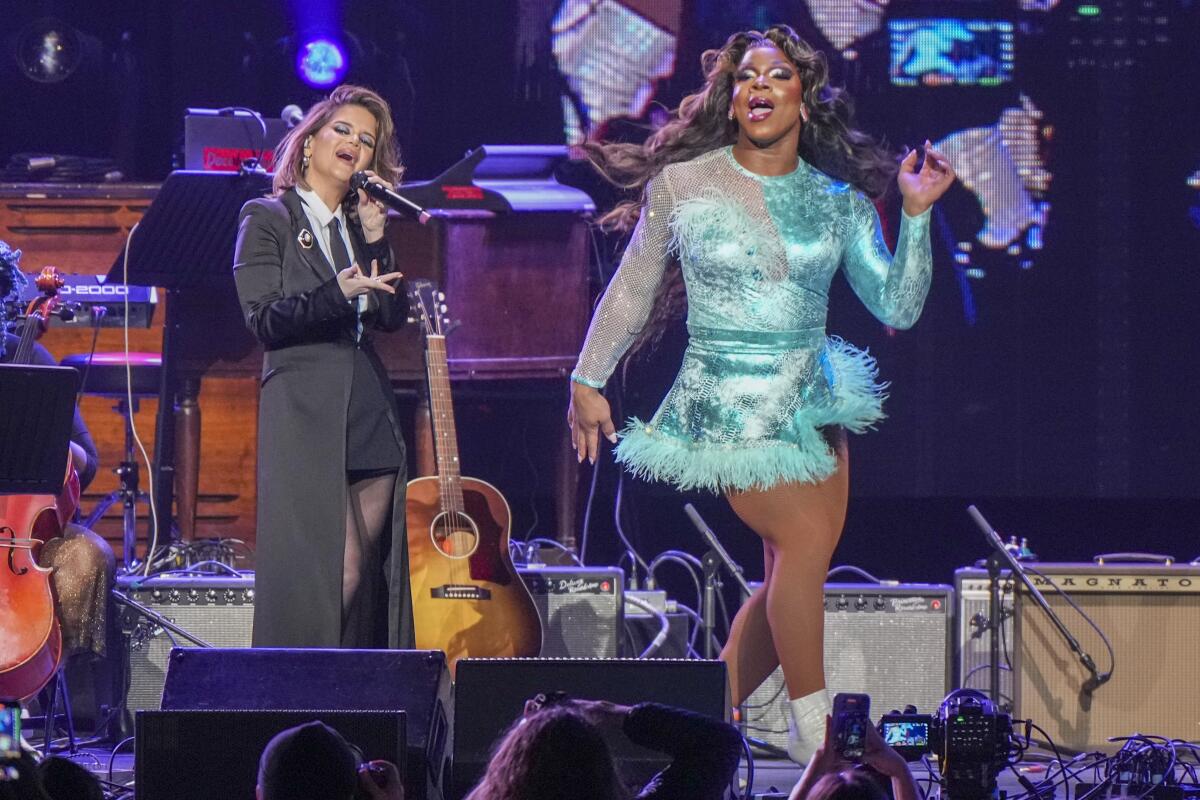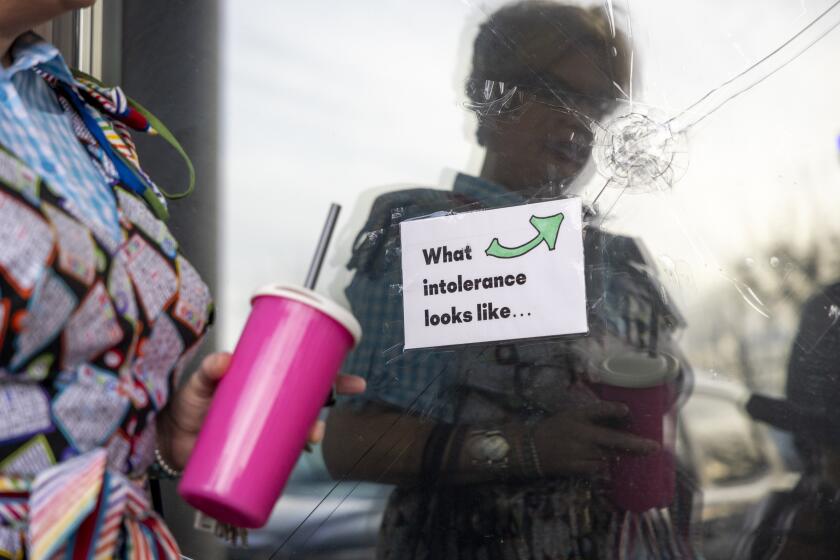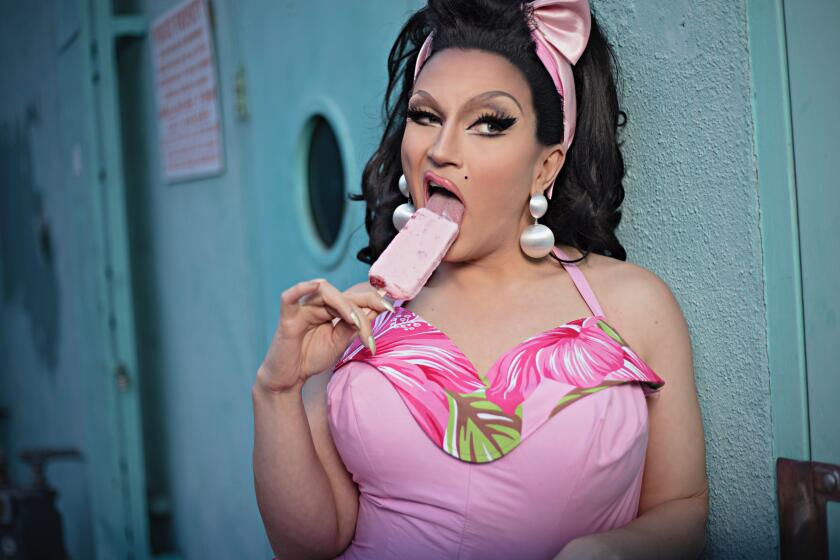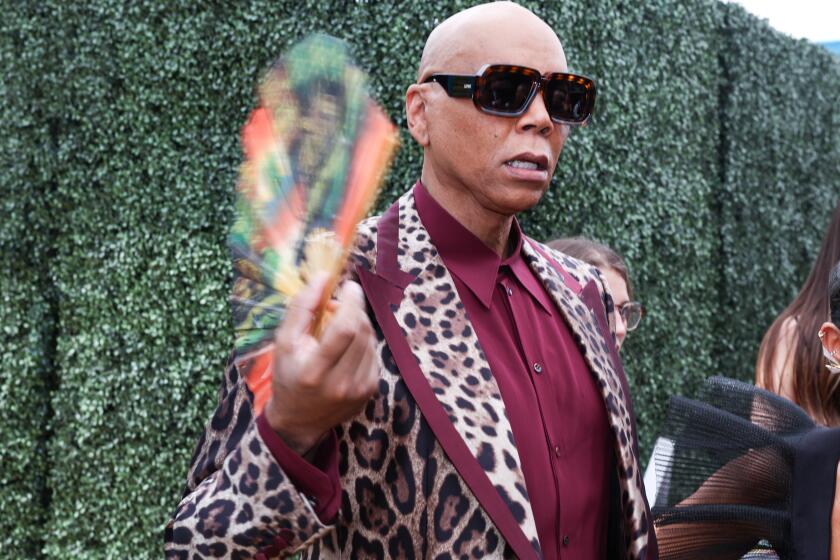Musicians fight threat of Tennessee anti-LGBTQ, drag bills

- Share via
NASHVILLE — When lawmakers in Tennessee passed legislation earlier this month targeting drag performances and transgender youth, many musicians who work in the state felt their own community, audiences and artistic expression were also under fire.
The trend of conservative-led legislatures introducing laws to limit LGBTQ rights or using hateful rhetoric about trans people has led the state’s tightknit musical community to use their talents to raise awareness and money and to encourage fans to get out and vote.
Love Rising, a concert held Monday in Nashville, featured Grammy winners such as Sheryl Crow alongside drag performers and trans and queer musicians. A second show, We Will Always Be, featured LGBTQ artists in collaboration with Black Opry on Tuesday.
“No one is in danger from our community, from our beautiful greater rainbow coalition of those of us who identify as LGBTQ+ or a drag performer or trans or just a loving ally,” said Grammy-nominated singer-songwriter Allison Russell, an organizer of Love Rising.
LGBTQ people have long been a part of the state’s music and entertainment industries, and drag has a storied history in Nashville and beyond.
Drag queens are more mainstream than ever, as are LGBTQ rights. Yet, story hours, where drag queens read to kids, have become a point of controversy and even violence.
Artists including Reba McEntire, Dolly Parton and Elvis Presley have inspired, or been inspired by, drag performances. Parton once said that she competed in a drag show alongside performers who were dressed as her — and lost. Nashville has a street named after Bianca Paige, a drag queen and advocate for people with HIV.
But in a state that has long championed creative communities, some musicians now feel threatened. The bill that passed this year classifies shows with “male or female impersonators” as adult cabaret and “harmful to minors,” along with topless dancers and strippers.
Backstage at Monday’s concert, Adeem the Artist, a nonbinary singer and songwriter, pointed to their flowery blouse and plum-colored lipstick and wondered aloud whether their stage outfit would run afoul of the new law going into effect July 1.
“I don’t always wear dresses, but I don’t even know if this is OK,” they said. “Am I allowed to wear lipstick? What does it mean to be dressed as the wrong gender?”
Adeem said they had declined the state’s invitation to an event honoring songwriters a few weeks ago.
“You don’t honor me. You’re challenging my livelihood; you’re challenging the safety of my kid,” they said.
Drag artist Justine Van De Blair wondered whether walking from a venue to a parking lot where minors might see her would be cause for arrest. The law bans adult cabaret from public property and places minors might be present.
L.A. drag queens and members of the queer community say that a wave of local anti-LGBTQ hate is just the beginning of the ripple effect from Tennessee laws prohibiting their way of life.
“I’m able to support myself. Drag is my creative outlet,” she said. “Unfortunately ... we don’t know what’s going to happen.”
Drag artists earned some of the biggest cheers at Love Rising as they rallied the audience between sets with passionate speeches, arguing that such laws were a harmful overreach of government and part of a fear-based campaign to roll back rights. They walked through the crowds to greet and take photos with fans, blowing air kisses and waving.
The money raised is going to pro-LGBTQ groups such as the Tennessee Equality Project. Donations were matched by foundations created by Grammy-winner Brandi Carlile and the family of late singer-songwriter John Prine.
The record number of anti-trans bills introduced in the U.S. in the last year, as well as rulings affecting bodily autonomy, have influenced some artists’ work.
Nashville-based singer-songwriter Aaron Lee Tasjan has written a song that he says reflects the “nightmare” that queer and trans people are experiencing.
“I’m seeing people in a great amount of mental and emotional distress over it,” he said.
Izzy Heltai, a pop singer-songwriter from Massachusetts, moved to Nashville recently for its industry connections. But he soon fell in love with its people, whose welcoming behavior seemed at odds with the state’s politics. A trans man who transitioned as a teen, he called the bans on gender-affirming care for youth life-threatening for a population already at high risk for suicide.
RuPaul, host of ‘RuPaul’s Drag Race,’ responded to anti-drag laws, urging Americans to vote and calling GOP efforts a ‘distraction technique.’
“There are a lot of kids that are going to die in the state because of these laws,” said Heltai, who played both concerts. “It’s not theoretical anymore. ... These laws are murdering people.”
Artists say Nashville’s music industry — still dominated by white men at the executive level and onstage — should be doing more to support artists who face such discrimination.
Holly G started Black Opry to give Black artists opportunities the mainstream country music industry has not. Those barriers exist for LGBTQ artists, producers and others as well, she said.
“The fight for racial equality is also the fight for LGBTQ+ equality,” she said. “We have to do all of that at the same time and together.”
Backstage at the Bridgestone Arena, drag queen Cya Inhale said she initially thought the drag community would have to stand alone, but instead she saw “the entire arts community in Nashville standing up saying, ‘No, that’s not OK.’ ”
Inhale noted that drag and country music often run in the same circles: “Do you think Dolly Parton is wearing all those rhinestones because a straight guy told her to? I don’t think so.”
More to Read
Get the L.A. Times Politics newsletter
Deeply reported insights into legislation, politics and policy from Sacramento, Washington and beyond. In your inbox twice per week.
You may occasionally receive promotional content from the Los Angeles Times.











